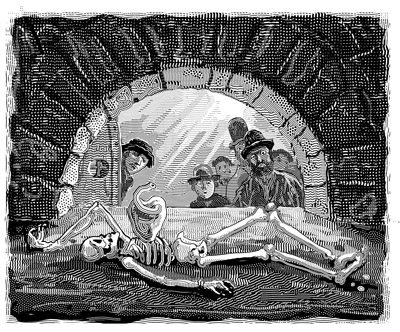In "The Birthmark," an alchemist named Alymer is increasingly troubled by his wife's single imperfection, a crimson-colored, hand-shaped birthmark upon her cheek. This minor imperfection begins to consume Aylmer until he can see little else. He seeks to eliminate this flaw from his wife's face by concocting potions. As one might guess, in the end the mark fades and disappears, but he has killed his wife in the process.
In "Ethan Brand," the main character sets upon a quest which troubles his heart to no end. He goes in search of "The Unpardonable Sin." He searches for it in the hearts of his fellowmen. Would you be surprised if I told you who harbored "The Unpardonable Sin"?
Hawthorne describes here the tragedy of Brand:
Then ensued that vast intellectual development, which, in its progress, disturbed the counterpoise between his mind and heart. The Idea that possessed his life had operated as a means of education; it had gone on cultivating his powers to the highest point of which they were susceptible; it had raised him from the level of an unlettered laborer to stand on a star-lit eminence, whither the philosophers of the earth, laden with the lore of universities, might vainly strive to clamber after him. So much for the intellect! But where was the heart? That, indeed, had withered--had contracted--had hardened--had perished! It had ceased to partake of the universal throb. He had lost his hold of the magnetic chain of humanity. He was no longer a brother-man, opening the chambers or the dungeons of our common nature by the key of holy sympathy, which gave him a right to share in all its secrets; he was now a cold observer, looking on mankind as the subject of his experiment, and, at length, converting man and woman to be his puppets, and pulling the wires that moved them to such degrees of crime as were demanded for his study.
Thus Ethan Brand became a fiend. He began to be so from the moment that his moral nature had ceased to keep the pace of improvement with his intellect. And now, as his highest effort and inevitable development--as the bright and gorgeous flower, and rich, delicious fruit of his life's labor--he had produced the Unpardonable Sin!
How many Ethan Brands are there among ed. "reformers"? They argue for lofty goals. Yet, as they set about on their path they use their supposedly superior intellects to destroy so much that is good. They forget the moral and humanistic purposes of education.
In holding teachers accountable for unrealistic levels of "proficiency," reformers attempt to eliminate "the birthmark." They would close and destroy every public school in their path towards perfection. How long will it be before they admit that the problems faced by so many school children more often than not have little to do with school, itself--and that their "solutions" will only make the problems worse. Perfect proficiency will never be achieved short of cut score manipulation, gaming data, the use of sub-par criteria, intimidation or tides of cheating.
And what legacies do the "reformers" leave in their wake?:
Testing becomes more important than learning.
Learning test-based knowledge becomes more important than helping children develop healthy and productive lives.
Students become ever-more anxious and fearful of school.
School becomes increasingly synonymous with drudgery.
Teachers resign, retire early and succumb to stress-related illnesses.
Making statistics look pretty replaces dealing in truths.
Schools are sold to the highest bidder.
Irrevocable harm is done to public schooling.
Communities are destroyed.
"Reformers" will search the heart of every teacher, looking for "The Unpardonable Sin." Would you be surprised if they, too, like Ethan Brand, had been looking in the wrong places? In the kiln of time, whose heart will be shown to have been made of marble?









